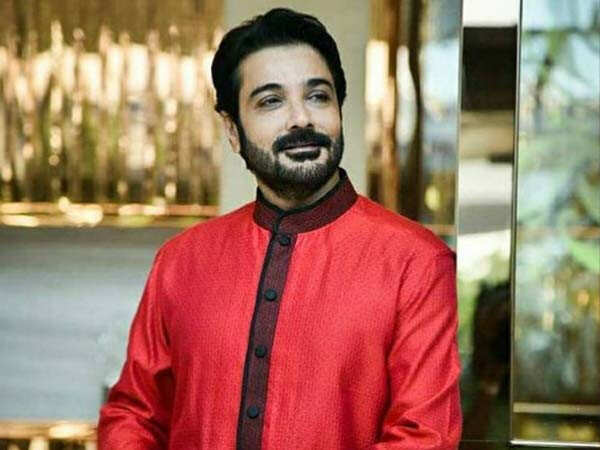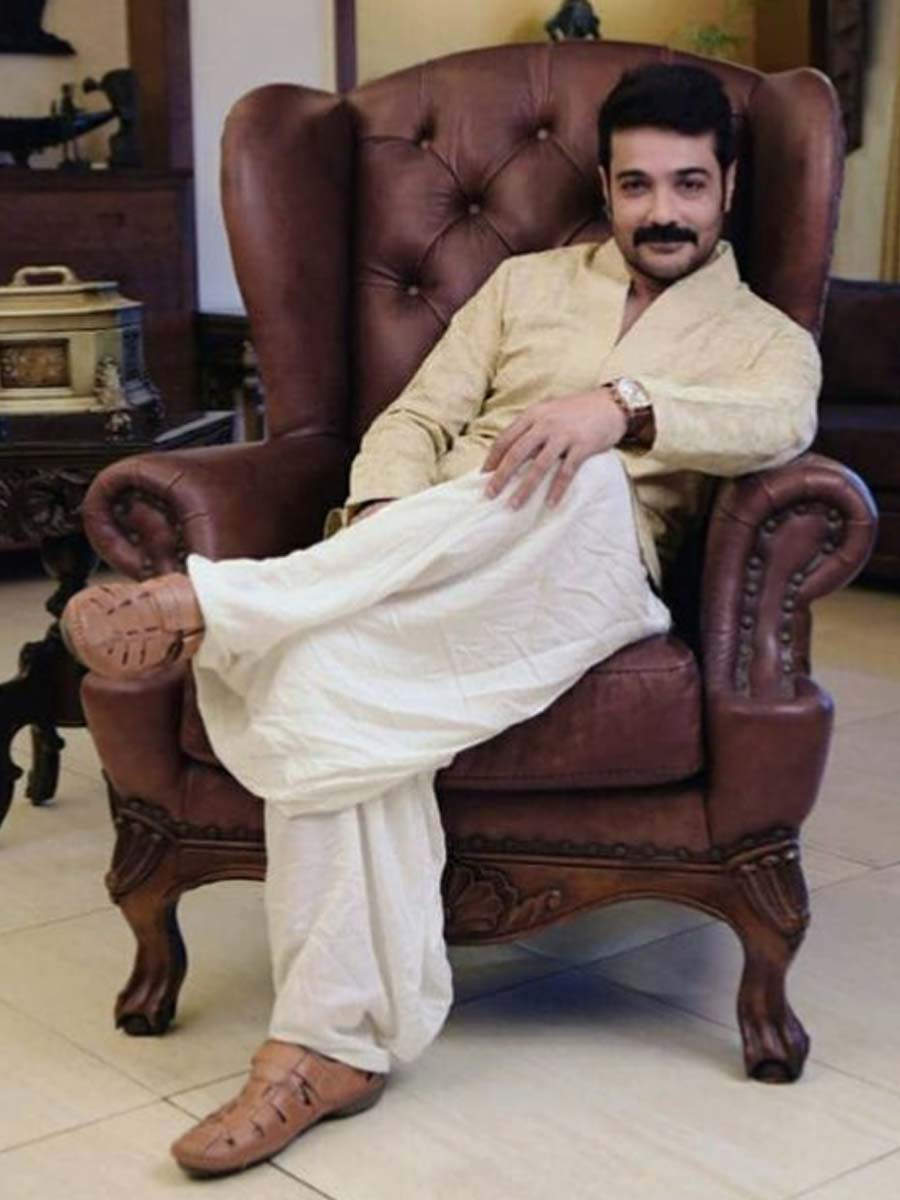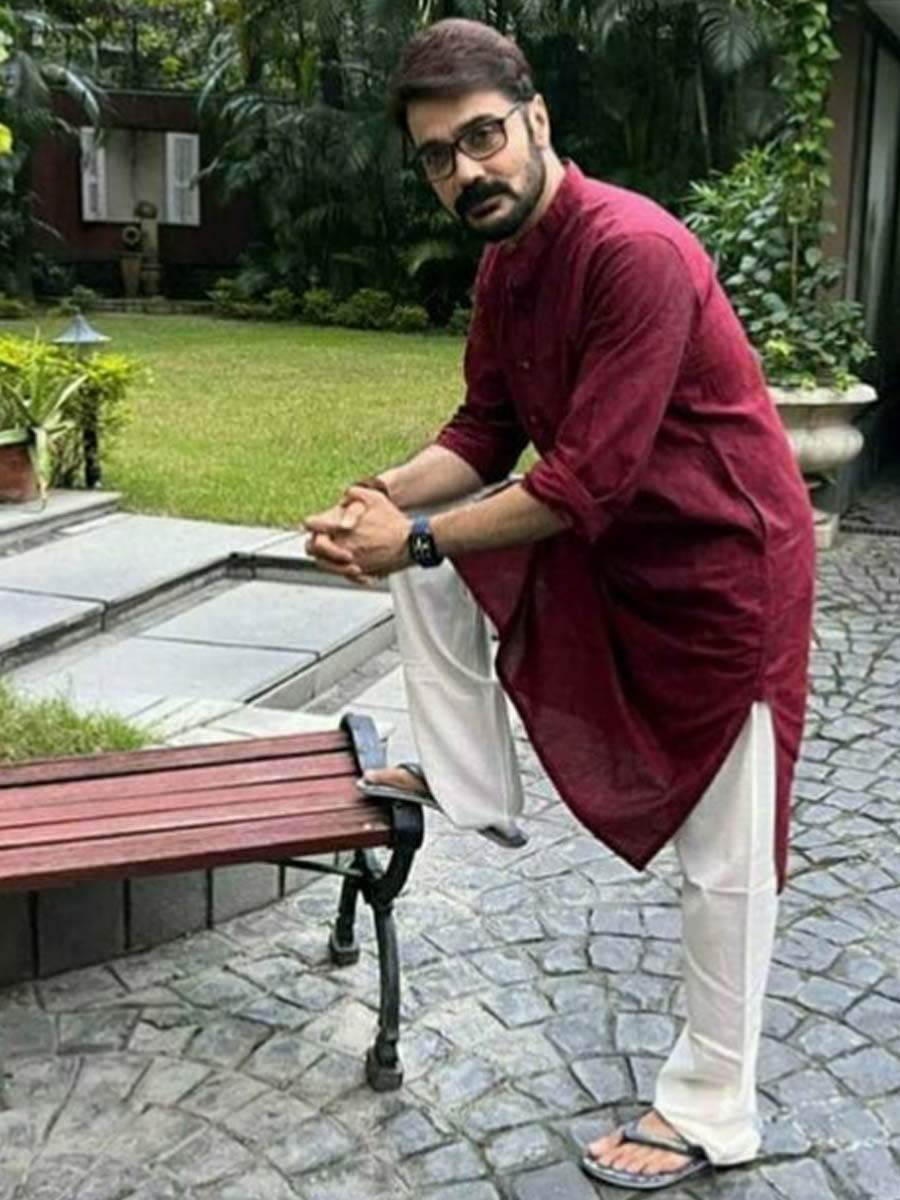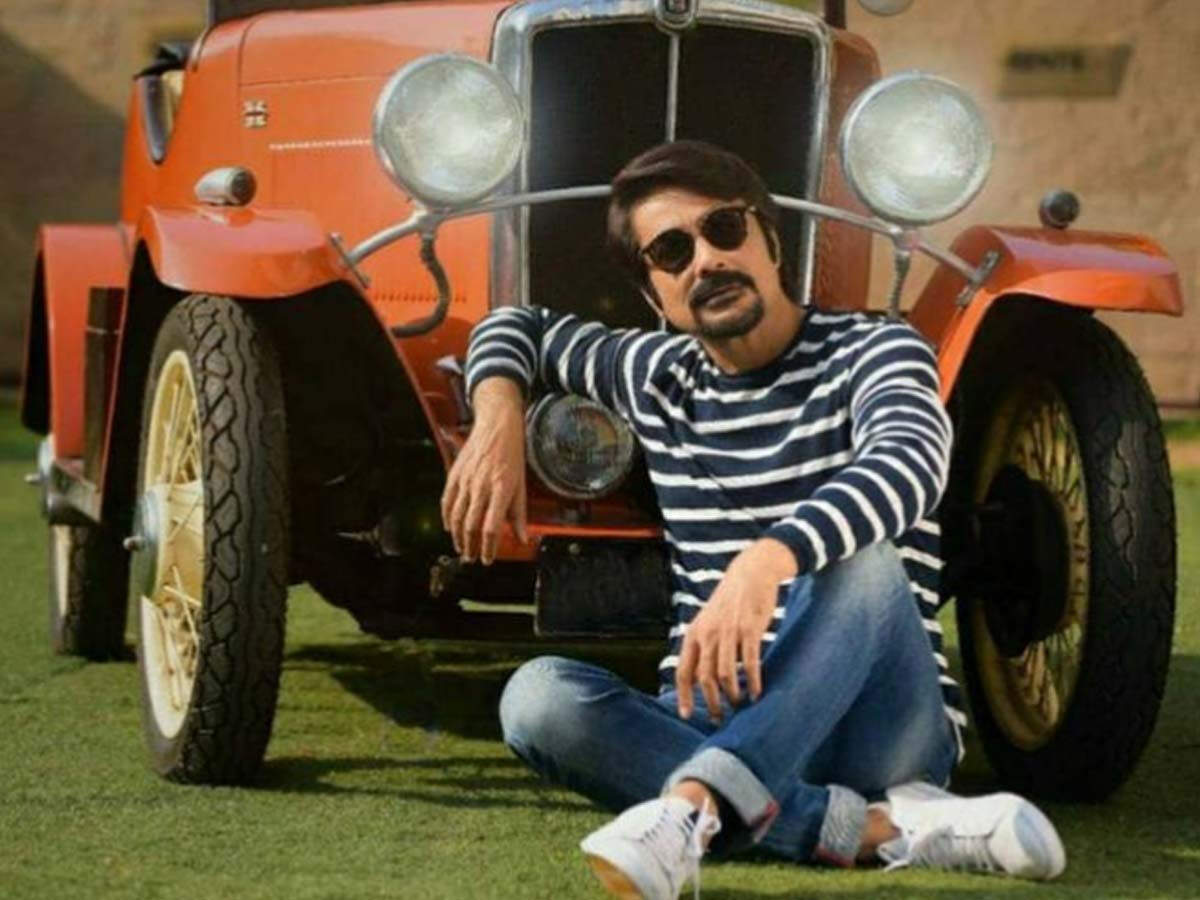
His name is legion. There was a time when he was called the one-man industry in Bengal. Prosenjit has seen the kind of adulation among the Bengali masses that we can only speculate upon. Everything he touched used to turn to gold. But even an emperor has to reinvent himself to stay relevant. And to the delight of his die-hard fans, the biggest star turned into the biggest performer. He started working with new-age filmmakers such as Rituparno Ghosh, Atanu Ghosh, Kaushik Ganguly, Srijit Mukherjee and Nandita Roy-Shiboprosad Mukherjee, and heralded another era of his superstardom. Despite his stature, he remains hungry for more and wants to better himself with each film. Excerpts from a candid interview with Bumba da, who insists he’s still a student despite four decades in films...
The big news is that you’re doing an OTT series.
I’ve seen a lot of changes in the past 35 to 38 years. There was VCR, television, then home theatre and DVD. At the end of the day, the magic of cinema endures but we have to embrace the new technology. I am excited to work on an OTT platform. A lot of people say that your box office goes down and all that but you know, I’ve done Mahanayak maybe two to three years ago and even Gumnaami was the biggest hit. In today’s day and age, we have to respect all the mediums. I’ve seen Mr Bachchan doing it, Soumitra Chatterjee doing it...Whatever you’re doing should be perfect.
Your performances in Gumnaami, Robibaar, Jyeshthoputro came in for a lot of critical acclaim. How do you carry yourself so seamlessly without the baggage of a superstar?
It used to be difficult. I’m talking about the time when Chokher Bali and Ram Lakhan were released in the same year. The latter ran for about 50 weeks and you all know how Chokher Bali created its own record. When I do a Ram Lakhan, the sound of my footsteps can elicit taaliyan and seetiyan. But when I do a Chokher Bali, Autograph or a Mayurakhsi, I have to realise that I’m not going to get that. I have to sacrifice that to get something else. I can’t get both. And you know, 15-20 years ago the Bengali press wouldn’t call me ‘Prosenjit’. They used to write ‘Prasanjit’. That was my image. But I appreciate that. Because that ‘Prasanjit’ and his 300 commercial blockbusters made me who I am today. But I thought, why would people not respect me as ‘Prosenjit’? So let me do some good work. And 15 years ago, I gave a very important interview where I said that I was making a conscious decision to continue doing mainstream cinema but I would change my image and give this space to the younger generation. Because mainstream cinema has to work. Without mainstream cinema, the industry will not survive. Mainstream cinema doesn’t have to be all about action and fights. For me, Pather Panchali is the biggest mainstream cinema. Till today, it continues to earn revenue. So for me, it’s good cinema or bad cinema. I understood that the language of cinema was changing and Srijit got me a film called Autograph. And you know that after Autograph, the entire scenario of Bengali cinema changed and that kind of cinema became the mainstream. The single theatre has to work. Otherwise, it is difficult for regional cinema to survive. That is my way of thinking about Bangla cinema.
So when you did Autograph or Chokher Bali, did you have to shed the mantle of a superstar?
There was a different Prosenjit inside me. It was Ritu da who gave birth to him. He suddenly shook me up and said, “Arre tere andar hai yeh” (You have it in you).And I’m lucky enough that then I got Srijit, Kaushik, Atanu and all these young directors to nurture me. So, I always say that the birth has been given by Ritu aur yeh young generation hame bada kar rahe hain (and the young generation of directors are nurturing me). I’m holding their hand and exploring myself and trying to do something different. Bumba da on the floor is just like a child. They know that even if they ask me for 30 shots, I will not hesitate to follow their lead. I have given them the space to be comfortable and say, “Bumba da, arekta shot (one more shot).” (Laughs) Now toh, I know that even after they say “cut”, they’ll ask for another shot. Like when Srijit says “very good”, I always say, “Tujhko aur ek chahiye na?” (You want another one, right?) So I know what “very good” means. I know now that when Kaushik gets up, he’s going to ask for another shot but he’ll come and tell me, “It was very nice but yeh jagah mai thoda sa…”
Why am I working with them? Because I need to learn everything from them. Raat ke do baje mai baat karta hoon unse phone pe. “Yeh shot jo hua na, that is not right and I want to do it again.”
(I call them up at 2 am and say, “That shot wasn’t right”).

How do you stay relevant? Is there a magic mantra?
I had 22 releases in a year once. Another year, six films were released between Durga Puja and Kali Puja. So, you can understand the kind of work I have done. Now, I do work only 60 to 90 days a year but I take time to prepare for the shoot. So, the answer to your question is that apko generation samajh aani chahiye (you must understand the new generation). Let’s talk about Yash ji because I’m a huge fan of his. This man, whatever the age, when he did a film, even our sons watched it. When I’d go to a party or a gathering, everyone would be like, “O Bumba da ‘’ but kids used to probably think, “Oh, my dad and mom are taking pictures with him”. So, I understood ki yeh baccha toh mera fan hai hi nahi. (I realised this child isn’t a fan of mine). Then I did Kakababu and you look at my house and you’ll see so many sketches from kids because to them, now I am Kakababu. I have a thing where I feel that everyday, I should gain one more fan. That’s my kick.
What was that one thing that defined your relationship with Soumitra Chatterjee?
I never speak about two people. One is Ritu da. I don’t speak about him because it wasn’t just a director-actor relationship. It was much more than that. And I don’t speak about Soumitra Kaku. In Mayurakshi, the powder sequence was not there in the script but it happened because of the relationship I shared with him. When I was 16 and my sister was getting married, there were a lot of problems and I was a nobody. I was not a star. I was not Prosenjit. I was just Bumba. And I told him, “Soumitra Kaku,
I need someone with me on that day” and from that time, Soumitra Kaku stood beside me. So, I hope you can understand that he’s just not an actor to me. In fact, at my 30-years-celebratory function, he was
on the stage as my family…
What kind of relationship do you share with your son?
(Laughs) First of all, technology. That connects us because when I don’t understand something, he comes and helps me. Of course, he’s studying outside India but he’s here now. And he has NO passion about cinema. He watches movies and nowadays, he understands Ray’s films but he wants to be a soccer player. He is totally dedicated to soccer. Of course, we encourage him and sports is something that I love. What I’m really liking about this OTT platform is that he is watching new work from actors. Like he watched AK vs AK. Then, he started watching Ram Lakhan. So, you see, his generation is going back and watching those films because of the connectivity. It’s interesting. One day, I saw him watching Feluda. What I’m trying to say is that this is a plus point for this generation to connect. When he came to know that his Soumitra Dadu passed away, I told him to watch all Soumitra’s films. He’s a huge fan of Sanjay Dutt. And of Salman Khan. He wears a bracelet with sapphire in it and all.

Are you a good father?
I’m not a good husband at all, you know that, but I am a good father. (Laughs) Yeah yeah, everybody knows. But yes, I’m a very responsible father. I’m someone who will try to understand and solve a problem and then I get back to my work.
This pandemic has brought about conversations about mental health and taught us that we need very little...
This pandemic has taught us a lot of things. But my first question is, did we learn anything? Practically, we have no power. It’s something else, I don’t know what. Some say it’s God, someone says it’s Allah. I don’t know what it is but we need to keep in mind that we don’t have any control over anything. If someone says that “oh Bumba da, you are a superstar”, I say no, I’m not. I’ve been born to deliver this work. I’m an actor. Because all these things don’t matter now. You just have to do your work the best way you can.

You mentioned the word ‘control’ and actors are known to be control freaks...
I have been working for years in Tollygunge and I know how many bricks there are on the studio floor. Really, I know that. So everyone there is like my family. But how can you control somebody? And you cannot control the audience. Can I say that this is my film which is going to release and it’s going to make this much money? You can only try to do the best to make your crew and producer happy. You can try your best and fight and struggle for success.
What has changed in your struggle over the decades?
For me, the first phase was to establish myself and then, there was a struggle that people shouldn’t just say that I’m Biswajeet’s son. I had to create my own image with all respect to my father. Then there was the Prasanjit to Prosenjit issue. Woh aur ek struggle hai. (That’s another struggle) Can you face a struggle when you are not just a star but a figure of respect in your industry? So keeping that respect intact and doing work with the same people is a huge struggle. And my final struggle till I’m alive is that people should love me as a human being.
The big news is that you’re doing an OTT series.
I’ve seen a lot of changes in the past 35 to 38 years. There was VCR, television, then home theatre and DVD. At the end of the day, the magic of cinema endures but we have to embrace the new technology. I am excited to work on an OTT platform. A lot of people say that your box office goes down and all that but you know, I’ve done Mahanayak maybe two to three years ago and even Gumnaami was the biggest hit. In today’s day and age, we have to respect all the mediums. I’ve seen Mr Bachchan doing it, Soumitra Chatterjee doing it...Whatever you’re doing should be perfect.
Your performances in Gumnaami, Robibaar, Jyeshthoputro came in for a lot of critical acclaim. How do you carry yourself so seamlessly without the baggage of a superstar?
It used to be difficult. I’m talking about the time when Chokher Bali and Ram Lakhan were released in the same year. The latter ran for about 50 weeks and you all know how Chokher Bali created its own record. When I do a Ram Lakhan, the sound of my footsteps can elicit taaliyan and seetiyan. But when I do a Chokher Bali, Autograph or a Mayurakhsi, I have to realise that I’m not going to get that. I have to sacrifice that to get something else. I can’t get both. And you know, 15-20 years ago the Bengali press wouldn’t call me ‘Prosenjit’. They used to write ‘Prasanjit’. That was my image. But I appreciate that. Because that ‘Prasanjit’ and his 300 commercial blockbusters made me who I am today. But I thought, why would people not respect me as ‘Prosenjit’? So let me do some good work. And 15 years ago, I gave a very important interview where I said that I was making a conscious decision to continue doing mainstream cinema but I would change my image and give this space to the younger generation. Because mainstream cinema has to work. Without mainstream cinema, the industry will not survive. Mainstream cinema doesn’t have to be all about action and fights. For me, Pather Panchali is the biggest mainstream cinema. Till today, it continues to earn revenue. So for me, it’s good cinema or bad cinema. I understood that the language of cinema was changing and Srijit got me a film called Autograph. And you know that after Autograph, the entire scenario of Bengali cinema changed and that kind of cinema became the mainstream. The single theatre has to work. Otherwise, it is difficult for regional cinema to survive. That is my way of thinking about Bangla cinema.
So when you did Autograph or Chokher Bali, did you have to shed the mantle of a superstar?
There was a different Prosenjit inside me. It was Ritu da who gave birth to him. He suddenly shook me up and said, “Arre tere andar hai yeh” (You have it in you).And I’m lucky enough that then I got Srijit, Kaushik, Atanu and all these young directors to nurture me. So, I always say that the birth has been given by Ritu aur yeh young generation hame bada kar rahe hain (and the young generation of directors are nurturing me). I’m holding their hand and exploring myself and trying to do something different. Bumba da on the floor is just like a child. They know that even if they ask me for 30 shots, I will not hesitate to follow their lead. I have given them the space to be comfortable and say, “Bumba da, arekta shot (one more shot).” (Laughs) Now toh, I know that even after they say “cut”, they’ll ask for another shot. Like when Srijit says “very good”, I always say, “Tujhko aur ek chahiye na?” (You want another one, right?) So I know what “very good” means. I know now that when Kaushik gets up, he’s going to ask for another shot but he’ll come and tell me, “It was very nice but yeh jagah mai thoda sa…”
Why am I working with them? Because I need to learn everything from them. Raat ke do baje mai baat karta hoon unse phone pe. “Yeh shot jo hua na, that is not right and I want to do it again.”
(I call them up at 2 am and say, “That shot wasn’t right”).

How do you stay relevant? Is there a magic mantra?
I had 22 releases in a year once. Another year, six films were released between Durga Puja and Kali Puja. So, you can understand the kind of work I have done. Now, I do work only 60 to 90 days a year but I take time to prepare for the shoot. So, the answer to your question is that apko generation samajh aani chahiye (you must understand the new generation). Let’s talk about Yash ji because I’m a huge fan of his. This man, whatever the age, when he did a film, even our sons watched it. When I’d go to a party or a gathering, everyone would be like, “O Bumba da ‘’ but kids used to probably think, “Oh, my dad and mom are taking pictures with him”. So, I understood ki yeh baccha toh mera fan hai hi nahi. (I realised this child isn’t a fan of mine). Then I did Kakababu and you look at my house and you’ll see so many sketches from kids because to them, now I am Kakababu. I have a thing where I feel that everyday, I should gain one more fan. That’s my kick.
What was that one thing that defined your relationship with Soumitra Chatterjee?
I never speak about two people. One is Ritu da. I don’t speak about him because it wasn’t just a director-actor relationship. It was much more than that. And I don’t speak about Soumitra Kaku. In Mayurakshi, the powder sequence was not there in the script but it happened because of the relationship I shared with him. When I was 16 and my sister was getting married, there were a lot of problems and I was a nobody. I was not a star. I was not Prosenjit. I was just Bumba. And I told him, “Soumitra Kaku,
I need someone with me on that day” and from that time, Soumitra Kaku stood beside me. So, I hope you can understand that he’s just not an actor to me. In fact, at my 30-years-celebratory function, he was
on the stage as my family…
What kind of relationship do you share with your son?
(Laughs) First of all, technology. That connects us because when I don’t understand something, he comes and helps me. Of course, he’s studying outside India but he’s here now. And he has NO passion about cinema. He watches movies and nowadays, he understands Ray’s films but he wants to be a soccer player. He is totally dedicated to soccer. Of course, we encourage him and sports is something that I love. What I’m really liking about this OTT platform is that he is watching new work from actors. Like he watched AK vs AK. Then, he started watching Ram Lakhan. So, you see, his generation is going back and watching those films because of the connectivity. It’s interesting. One day, I saw him watching Feluda. What I’m trying to say is that this is a plus point for this generation to connect. When he came to know that his Soumitra Dadu passed away, I told him to watch all Soumitra’s films. He’s a huge fan of Sanjay Dutt. And of Salman Khan. He wears a bracelet with sapphire in it and all.

Are you a good father?
I’m not a good husband at all, you know that, but I am a good father. (Laughs) Yeah yeah, everybody knows. But yes, I’m a very responsible father. I’m someone who will try to understand and solve a problem and then I get back to my work.
This pandemic has brought about conversations about mental health and taught us that we need very little...
This pandemic has taught us a lot of things. But my first question is, did we learn anything? Practically, we have no power. It’s something else, I don’t know what. Some say it’s God, someone says it’s Allah. I don’t know what it is but we need to keep in mind that we don’t have any control over anything. If someone says that “oh Bumba da, you are a superstar”, I say no, I’m not. I’ve been born to deliver this work. I’m an actor. Because all these things don’t matter now. You just have to do your work the best way you can.

You mentioned the word ‘control’ and actors are known to be control freaks...
I have been working for years in Tollygunge and I know how many bricks there are on the studio floor. Really, I know that. So everyone there is like my family. But how can you control somebody? And you cannot control the audience. Can I say that this is my film which is going to release and it’s going to make this much money? You can only try to do the best to make your crew and producer happy. You can try your best and fight and struggle for success.
What has changed in your struggle over the decades?
For me, the first phase was to establish myself and then, there was a struggle that people shouldn’t just say that I’m Biswajeet’s son. I had to create my own image with all respect to my father. Then there was the Prasanjit to Prosenjit issue. Woh aur ek struggle hai. (That’s another struggle) Can you face a struggle when you are not just a star but a figure of respect in your industry? So keeping that respect intact and doing work with the same people is a huge struggle. And my final struggle till I’m alive is that people should love me as a human being.
Next Story